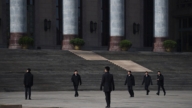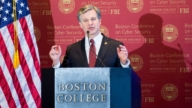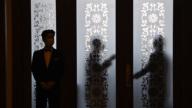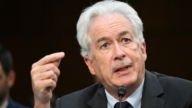【新唐人2014年11月04日讯】中共全国人大常委会在日前表决通过“反间谍法”,这是中共首次以法律形式具体界定所谓的间谍行为,并明确5类间谍行为将受到法律追究。有分析指出,“反间谍法”有利于中共打击大陆异见人士,也有分析认为,这个法律是为了应对中共目前所面临的新形势。
11月1号,中共第十二届全国人大常委会第11次会议,表决通过了“反间谍法”,中共国家主席习近平随即签署后并公布实施,而施行了21年的“国家安全法”也随之宣告废止。
中共“反间谍法”明定的间谍行为,是指危害国家安全的境内外机构、个人或间谍组织的直接、间接或相互勾结行径。依据这部法律,无论是国内外团体或个人,凡试图获取或非法提供国家秘密或者情报,以及设法使公务人员叛变,或为敌人指示攻击目标的,都是“间谍”,将追究刑事责任。
据大陆《南方都市报》报导,反间谍法草案并没有提请表决,部分人大常委会委员对草案有质疑。例如委员董中原指出,草案显然非常注重反间谍的各种手段和功能,但对于公民的权利如何保护,并没有涉及。
大陆一位不愿透露身份的法律专家向香港《明报》表示,《反间谍法》对间谍行为的规定较为笼统,实际上是赋予国家安全机关更大的权力;在反间谍的名义下,国家安全机关更容易打击大陆异见人士以及民间组织。
前中共国务院秘书俞梅荪:“为了加强维护国家安全问题,为了加强维护国家安全部门的法律地位,专门给他们制定维护国家安全的法,这样,更加促使国家安全部门的特殊性,他们就会无法无天。”
大陆独立时政观察人士华颇:“它有个第五条,其他被有关部门认定的间谍行为,就非常的含糊,这样就给有关部门很大的裁量权,到底是什么行为,有关部门会认定为间谍行为呢?这条法律非常笼统。另外,向国外有关个人提供国家机密,首先,国家机密是什么范畴,界线在哪,个人的界线又在哪,向国外媒体记者爆料算不算,这个非常含糊。”
“反间谍法”是由“国家安全法”修订更名而来,美国《纽约时报》指出,新条款将打击目标更加集中在外国间谍,以及与之合作的中国个人和组织。
报导援引分析人士的话说,“反间谍法”反映了,面对来自境外越来越大的政治威胁,中共当局非常担心。
报导还说,“反间谍法”第二条规定,执行反间谍工作,要与所谓的“群众路线”相结合,这表明了中共当局想通过中国民众的参与,让反间谍法的贯彻更加深入。
另外,“反间谍法”第三条规定,国家安全机关是反间谍工作的主管机关。美国军事研究机构CNA分析师坦纳(Murray Scot Tanner)向《纽约时报》指出,“反间谍法”淡化了中共公安警察部队以及国家秘密部门和其他机构的角色。他说,这让人窥视到安全职责重叠的政府和军队机构之间的争斗。
中共《新华社》方面则指称,出于国家安全需要,这个法律能更好的因应新形势和新任务。
大陆独立时政观察人士华颇认为,中共施行反间谍法,与最近持续发酵的香港“占中”运动有关。
华颇:“你要想实行民主宪政,对中共的一党执政提出异议,那就是它的威胁,这是不言而喻的,我想,它的威胁一直存在,因为中国人也想自由地进行普选,香港占中的诉求,也是全中国人民的诉求。”
此前中共方面曾宣称,“占中”运动挑战国家安全,是港版的“颜色革命”,藏有巨大阴谋等。香港特首梁振英也指称,有所谓的“外部势力”介入“占中”运动。尽管这些说法备受争议,并且至今未能拿出相关证据,外界仍然担心,被当局套上“威胁国家安全”的帽子后,“占中”运动随时会被腰斩。
采访/秦雪、陈汉 编辑/陈洁
China Passes Counterespionage Law In Response to the New Situation?
The Communist National People’s Congress passed its first
counterespionage law which defines five categories of spy
activities subject to legal accountability.
Analysts believe the new law allows the Communist regime
to crack down on dissidents.
Others believe the new law was established to meet
the new situation the regime is faced with.
The Counterespionage Law was passed in the National
People’s Congress meeting on Nov. 1 and signed
by Chinese President Xi Jinping to replace the National
Security Law that had been practiced for 21 years.
The Counterespionage Law targets foreign spies and Chinese
institutes and individuals who collaborate with them.
Any entity that engages in intelligence activities, mutiny
or assistance to the enemy is a spy whose acts
will be held criminally responsible.
Southern Metropolis Daily reported that
the counterespionage draft did not go through the motion
and was questioned by certain members
of the Standing Committee.
For instance, Dong Zhongyuan had pointed out the draft
only focused on measures of counterespionage
but ignored citizen rights.
An anonymous legal expert told Hong Kong’s Ming Pao Daily
that the Counterespionage Law provides relatively general
rule regarding spy activities, but in fact empowers
the national security organ which can easily attack dissidents
in the name of counterespionage.
Former secretary of the Communist State Council,
Yu Meisun: “This new national security law was set
in the name of securing the nation, the legal status
and the particularity of the national security organ
which will even become lawless."
Independent China politics observer Hua Po: “In the fifth
category of spy activities, ‘the other recognized
spy activities,’ is very vague.
It is actually up to the discretion of the security sector.
What kind of activities will be considered spy activities?
It is not clearly defined.
Also, there is ‘providing state secrets to foreign entities.’
First of all, what is the scope of state secrets?
What is the bottom line?
Will whistleblowers to foreign journalists be considered
spy activities? It is very vague."
New York Times reported, the new Counterespionage Law,
“will more closely target foreign spies and Chinese
individualsand organizations who collaborate with them."
“The change suggests concerns at the top of the Communist
Party that China faces growing political threats
from overseas,analysts said."
New York Times also said, “the second article of the new law
states that its new primary goal — counterespionage —
will be carried out in concert with the ‘mass line’."
The Counterespionage Act regulates that national security
organs are the working authorities.
Murray Scot Tanner, an analyst at CNA Corporation,
told the NY Times, “It implicitly downplays, by name, the role
of China’s largest security bureaucracy — the Public Security
police force — as well as China’s State Secrets departments
and other agencies."
It was, he said, “a rare glimpse at the bureaucratic rivalries
among the many government and military agencies
that have overlapping responsibilities for security."
Xinhua News Agency said that the law was better suited
to “a new situation, and new tasks, facing the country’s
security needs".
Hua Po believes the Counterespionage Act is actually
a reaction to the Occupy Central movement in Hong Kong.
Hua Po: “The implementation of the democratic constitution
and questioning the Communist one-party ruling
are no doubt threats to the regime.
I believe the threat has existed all the time.
The demands of Occupy Central are not just the demands
of Hong Kong, but of the entire Chinese."
The Communist regime has claimed that Occupy Central
challenges the state security, it’s a color revolution
and a huge conspiracy.
Hong Kong Chief Executive Leung Chun-ying also alleged that
so-called foreign forces have intervened in the movement.
Despite these claims being controversial and there being
a lack of relevant evidence, it is suspected that once
it is labeled “a threat to state security", the Occupy Central
movement will be cleared at any time.
Interview/QinXue ChenHan Edit/ChenJie

























